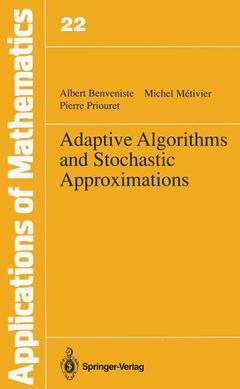Adaptive Algorithms and Stochastic Approximations, Softcover reprint of the original 1st ed. 1990 Stochastic Modelling and Applied Probability Series, Vol. 22
Langue : Anglais
Auteurs : Benveniste Albert, Metivier Michel, Priouret Pierre

Adaptive systems are widely encountered in many applications ranging through adaptive filtering and more generally adaptive signal processing, systems identification and adaptive control, to pattern recognition and machine intelligence: adaptation is now recognised as keystone of "intelligence" within computerised systems. These diverse areas echo the classes of models which conveniently describe each corresponding system. Thus although there can hardly be a "general theory of adaptive systems" encompassing both the modelling task and the design of the adaptation procedure, nevertheless, these diverse issues have a major common component: namely the use of adaptive algorithms, also known as stochastic approximations in the mathematical statistics literature, that is to say the adaptation procedure (once all modelling problems have been resolved). The juxtaposition of these two expressions in the title reflects the ambition of the authors to produce a reference work, both for engineers who use these adaptive algorithms and for probabilists or statisticians who would like to study stochastic approximations in terms of problems arising from real applications. Hence the book is organised in two parts, the first one user-oriented, and the second providing the mathematical foundations to support the practice described in the first part. The book covers the topcis of convergence, convergence rate, permanent adaptation and tracking, change detection, and is illustrated by various realistic applications originating from these areas of applications.
I. Adaptive Algorithms: Applications.- 1. General Adaptive Algorithm Form.- 1.1 Introduction.- 1.2 Two Basic Examples and Their Variants.- 1.3 General Adaptive Algorithm Form and Main Assumptions.- 1.4 Problems Arising.- 1.5 Summary of the Adaptive Algorithm Form: Assumptions (A).- 1.6 Conclusion.- 1.7 Exercises.- 1.8 Comments on the Literature.- 2. Convergence: the ODE Method.- 2.1 Introduction.- 2.2 Mathematical Tools: Informal Introduction.- 2.3 Guide to the Analysis of Adaptive Algorithms.- 2.4 Guide to Adaptive Algorithm Design.- 2.5 The Transient Regime.- 2.6 Conclusion.- 2.7 Exercises.- 2.8 Comments on the Literature.- 3. Rate of Convergence.- 3.1 Mathematical Tools: Informal Description.- 3.2 Applications to the Design of Adaptive Algorithms with Decreasing Gain.- 3.3 Conclusions from Section 3.2.- 3.4 Exercises.- 3.5 Comments on the Literature.- 4. Tracking Non-Stationary Parameters.- 4.1 Tracking Ability of Algorithms with Constant Gain.- 4.2 Multistep Algorithms.- 4.3 Conclusions.- 4.4 Exercises.- 4.5 Comments on the Literature.- 5. Sequential Detection; Model Validation.- 5.1 Introduction and Description of the Problem.- 5.2 Two Elementary Problems and their Solution.- 5.3 Central Limit Theorem and the Asymptotic Local Viewpoint.- 5.4 Local Methods of Change Detection.- 5.5 Model Validation by Local Methods.- 5.6 Conclusion.- 5.7 Annex: Proofs of Theorems 1 and 2.- 5.8 Exercises.- 5.9 Comments on the Literature.- 6. Appendices to Part I.- 6.1 Rudiments of Systems Theory.- 6.2 Second Order Stationary Processes.- 6.3 Kaiman Filters.- II. Stochastic Approximations: Theory.- 1. O.D.E. and Convergence A.S. for an Algorithm with Locally Bounded Moments.- 1.1 Introduction of the General Algorithm.- 1.2 Assumptions Peculiar to Chapter 1.- 1.3 Decomposition of the General Algorithm.- 1.4 L2 Estimates.- 1.5 Approximation of the Algorithm by the Solution of the O.D.E.- 1.6 Asymptotic Analysis of the Algorithm.- 1.7 An Extension of the Previous Results.- 1.8 Alternative Formulation of the Convergence Theorem.- 1.9 A Global Convergence Theorem.- 1.10 Rate of L2 Convergence of Some Algorithms.- 1.11 Comments on the Literature.- 2. Application to the Examples of Part I.- 2.1 Geometric Ergodicity of Certain Markov Chains.- 2.2 Markov Chains Dependent on a Parameter ?.- 2.3 Linear Dynamical Processes.- 2.4 Examples.- 2.5 Decision-Feedback Algorithms with Quantisation.- 2.6 Comments on the Literature.- 3. Analysis of the Algorithm in the General Case.- 3.1 New Assumptions and Control of the Moments.- 3.2 Lq Estimates.- 3.3 Convergence towards the Mean Trajectory.- 3.4 Asymptotic Analysis of the Algorithm.- 3.5 “Tube of Confidence” for an Infinite Horizon.- 3.6 Final Remark. Connections with the Results of Chapter 1.- 3.7 Comments on the Literature.- 4. Gaussian Approximations to the Algorithms.- 4.1 Process Distributions and their Weak Convergence.- 4.2 Diffusions. Gaussian Diffusions.- 4.3 The Process U?(t) for an Algorithm with Constant Step Size.- 4.4 Gaussian Approximation of the Processes U?(t).- 4.5 Gaussian Approximation for Algorithms with Decreasing Step Size.- 4.6 Gaussian Approximation and Asymptotic Behaviour of Algorithms with Constant Steps.- 4.7 Remark on Weak Convergence Techniques.- 4.8 Comments on the Literature.- 5. Appendix to Part II: A Simple Theorem in the “Robbins-Monro” Case.- 5.1 The Algorithm, the Assumptions and the Theorem.- 5.2 Proof of the Theorem.- 5.3 Variants.- Subject Index to Part I.- Subject Index to Part II.
Date de parution : 02-2012
Ouvrage de 365 p.
15.5x23.5 cm
Thèmes d’Adaptive Algorithms and Stochastic Approximations :
© 2024 LAVOISIER S.A.S.
